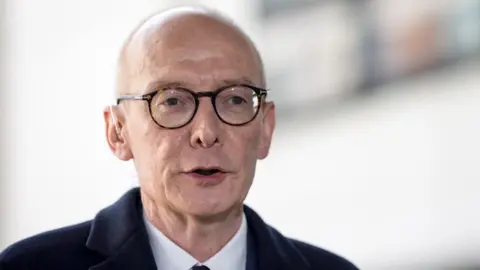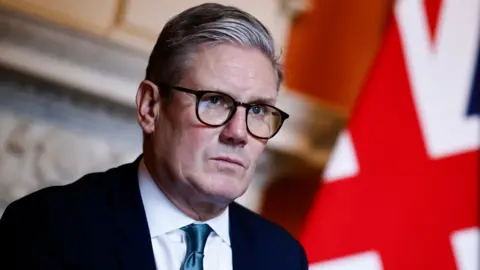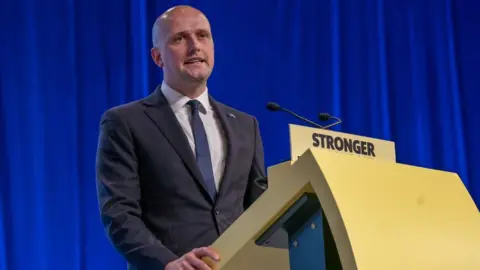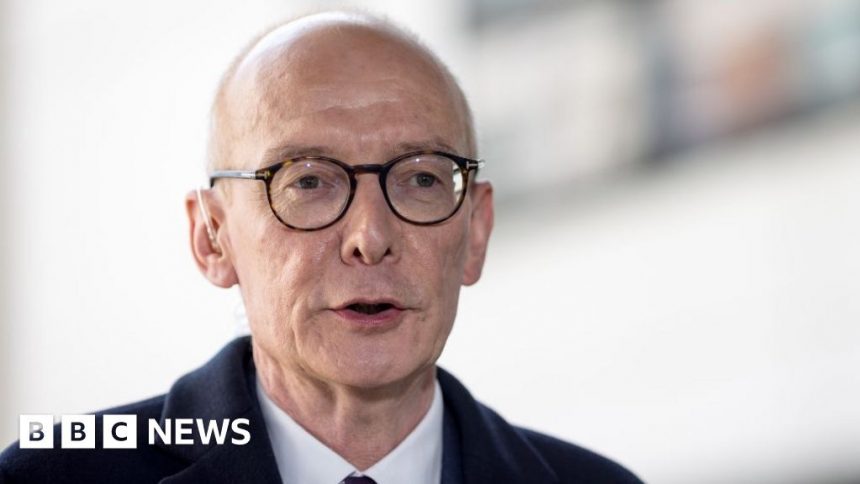Labour rules out GB Energy announcement in King’s Speech
 Getty Images
Getty ImagesThe location of the Scottish headquarters of a new publicly owned energy company will not be announced in the King’s Speech, a cabinet minister has said.
Chancellor of the Duchy of Lancaster Pat McFadden said further details about GB Energy would be confirmed in “due course”.
He said while the government wanted to move quickly, it was yet to make a decision.
Prime Minister Sir Keir Starmer has pledged the firm will drive the transition to clean energy bring a “huge number” of skilled jobs to Scotland.
The new Labour government’s plans for the coming year will be read out by King Charles in a speech to Parliament later.
But Mr McFadden, the MP for Wolverhampton South East who formerly worked for ex-prime minister Tony Blair, said the location of GB Energy would not be included.
He told BBC Radio’s Good Morning Scotland: “I think it’s a huge opportunity for Scotland, the energy transition is one that’s for the whole of the UK.
“I think it’ll be great to have the headquarters of that in Scotland, exactly where, we’ll announce in due course.”
In 2022, Labour said GB Energy would be a “publicly-owned clean energy generation company”, which would operate like Sweden’s Vattenfall or Denmark’s Orsted.
But in subsequent interviews, Sir Keir it would actually be “an investment vehicle” rather than an energy production firm.
Unions have called for more clarity about the plans.
 Getty Images
Getty ImagesMr McFadden, who was Labour’s national campaign coordinator during the election, was also asked about his party’s policy on the North Sea oil and gas industry.
Labour has said it would not issue new oil and gas licences, and would extend the windfall tax on energy companies, which OEUK says could threaten some jobs.
But the party has pledged not to overturn existing licences and said that oil and gas would still be part of the energy mix for decades to come.
“We’ll be drilling for oil and gas in the North Sea for some time,” McFadden said.
“There’s an established industry there. There are licenses that have already been granted.”
He added: “Again, that’s something that we said before the election, and so what you’d expect our actions to be after the election should be consistent with that.”
Two-child cap
Another issue that is not expected to be addressed in the King’s Speech is the two-child benefit cap.
The cap, introduced as part of austerity measures under the Conservative government in 2017, prevents parents from claiming universal credit or child tax credit for a third child, with a few exemptions.
The Child Poverty Action Group in Scotland said that abolishing the cap, which it estimated would cost £1.3bn, would lift 250,000 children in the UK out of poverty, including up to 15,000 in Scotland.
Asked repeatedly if he agreed that the cap caused harm, Mr McFadden said it was “open to debate”.
Sir Keir has said a Labour government would not change the policy, insisting he would not commit extra money to benefits without first growing the economy.
Scottish Labour leader Anas Sarwar said he would press Sir Keir to scrap the policy when Labour won power.
Mr McFadden said that while he understood calls for the policy to be scrapped, the King’s Speech would be about “the change that we talked about in our manifesto, that wasn’t in our manifesto”.
 PA Media
PA MediaSNP Westminster leader Stephen Flyn has said his party would table an amendment to the King’s Speech to end the cap.
He said it was “extraordinary” Mr McFadden refused to accept the measure caused harm.
Mr Flynn called for Labour “to do the right thing”, arguing the UK government had the fiscal levers to raise tens of billions of pounds, more than was needed to pay for the costs of scrapping the cap.
Asked why the SNP government did not mitigate the effects of the policy north of the border, he said it had already introduced the Scottish Child Payment but that Holyrood’s finances were “hugely constrained” by Westminster.
“If we were to choose to mitigate one of their policies again it would come at the expense of Scotland’s health service, Scotland’s education service, Scotland’s police force,” he told Good Morning Scotland.






